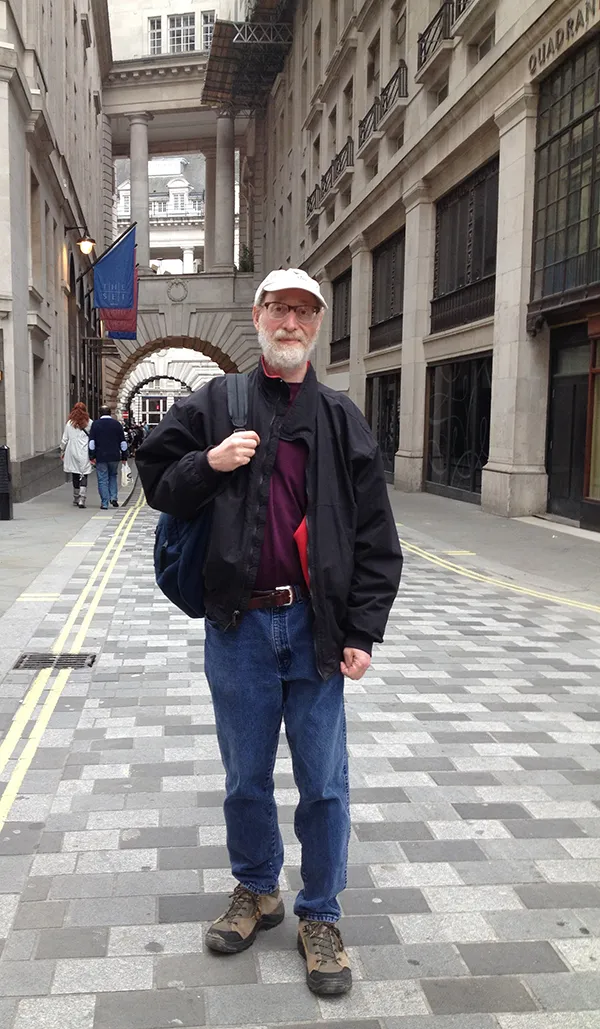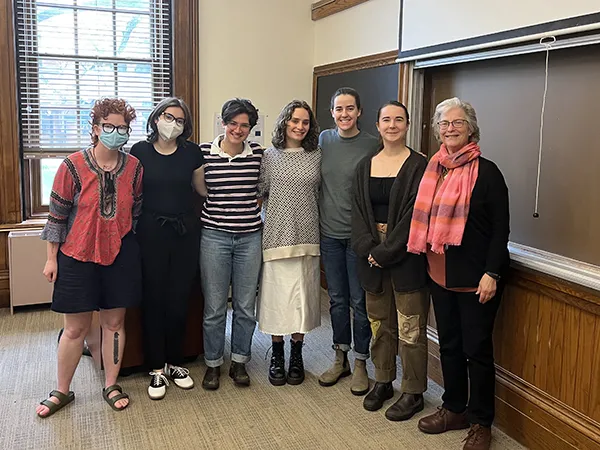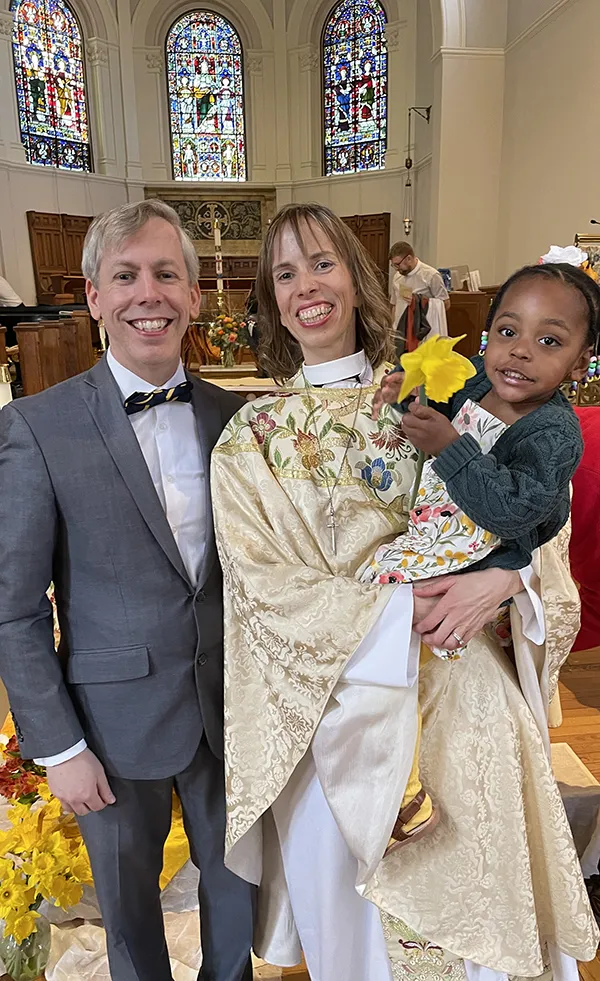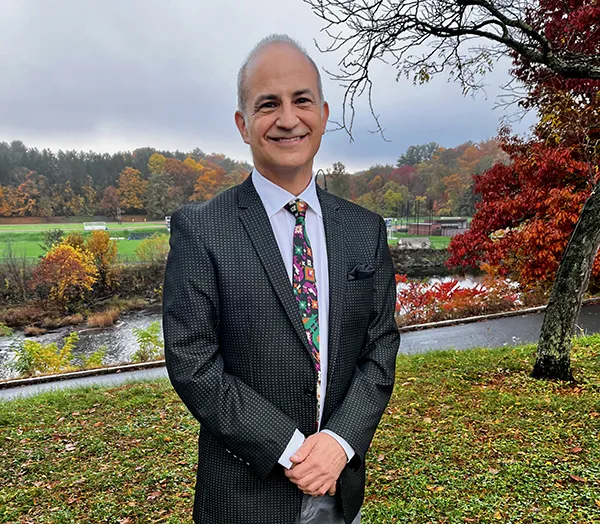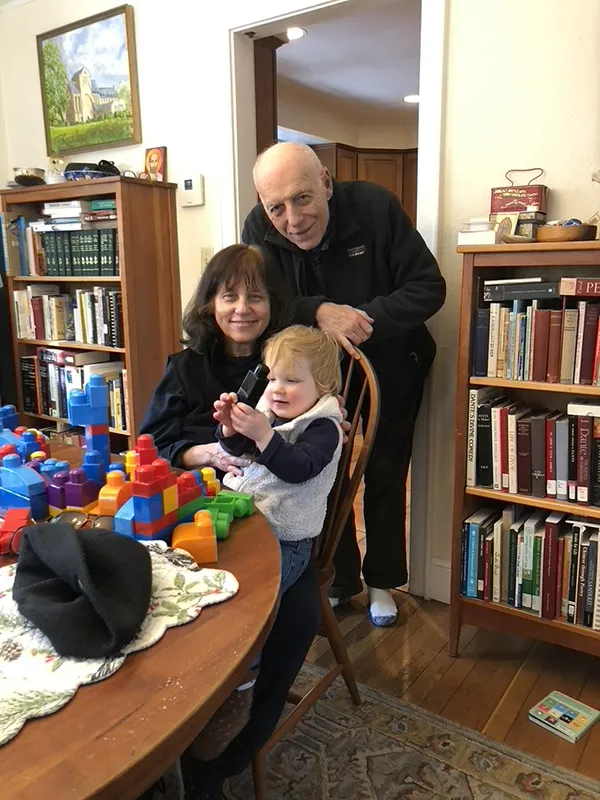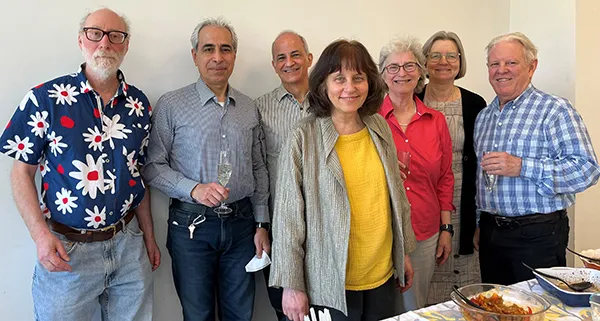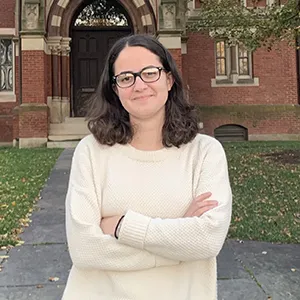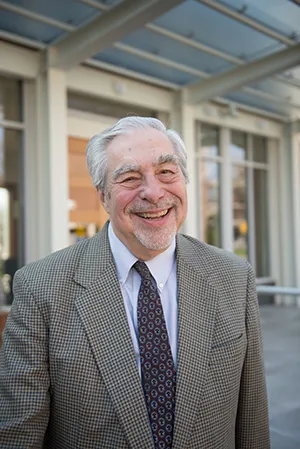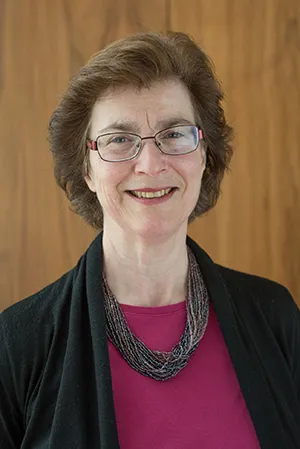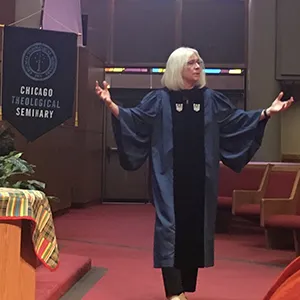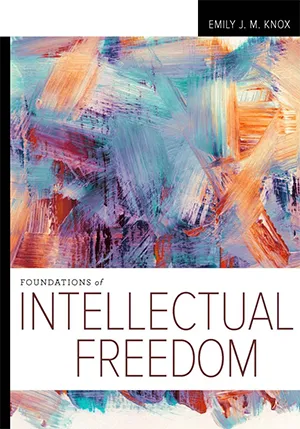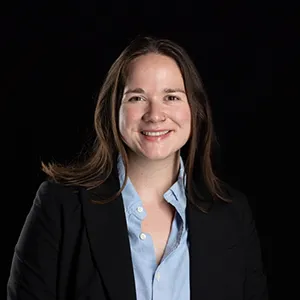Religion - Newsletter June 2023
June 2023
Spring 2024
Graduates & Awards
James Gardner Buttrick Prize
For the best essay written by a Smith undergraduate on a subject in the field of religious studies
Julia Batson ’23, “Before the Start, Beyond the Finish Line: The Head of the Charles Regatta, Pilgrimage, and the Importance of the Journey”
Grayson Hawthorn ’24, “For Faith and For The Homeland: The Canonization of the Armenian Genocide Victims in the Armenian Apostolic Church”
Zoe Kruse '23, "Faith-Based Credit Unions: Community, Values, and the Solidarity Economy"
Henry Lewis Foote Memorial Prize
For the best essay written by a Smith undergraduate on a subject in the field of biblical studies
Morgan Hatherill ’24, “Sufferers and Survivors”
Ella Wiegers ’23, “Mother of All Living: Eve As Mother”
Jochanan H.A. Wijnhoven Prize
For the best essay written by a Smith undergraduate on a subject in Jewish religious
Isadora Kianovsky ’23, “Anger into Art: An Examination of Anger in Post-Holocaust Writings and Their Impact Today”
Class of 2023
Senior Honors Thesis: Zoe Kruse ’23
"Faith-Based Credit Unions: Community, Values, and the Solidarity Economy"
Faith-based credit unions are a small section of the credit union movement and have not received significant scholarly attention. In my thesis, I focus on how they have navigated their identity as a series of regulatory changes over the past three decades have allowed credit unions to expand their fields of membership. I conducted seven semi-structured interviews and argue that faith-based credit unions are a quotidian but understudied example of the convergence of morals and markets.
Faith-based credit unions create an imagined community, but at a certain size they can no longer think about face-to-face relationships and instead emphasize values. This creates the notion that credit unions are brand-like, but not ultimately a brand because their mission is not to maximize profit. The decision to serve people over profit positions faith-based credit unions as practitioners of the nascent solidarity economy. I hope to demonstrate that faith-based credit unions are deserving of significant future work.
Remembering Professor Karl Donfried (1940–2022)
At a faculty meeting held this spring, Carol Zaleski delivered this memorial minute for Karl Donfried.
Karl Paul Donfried, an internationally renowned scholar of biblical and ecumenical studies, joined the Smith faculty in 1968. He was a mainstay of the Religion Department as it crossed the threshold into the third millennium, and he served as Elizabeth A. Woodson Professor of Religion and Biblical Literature until his retirement in 2005.
Karl was born and raised in New York City to German émigré parents. After attending Trinity School, Karl became the first member of his family to go to college, receiving his bachelor’s degree from Columbia, M.Div. from Harvard Divinity School, S.T.M. from Union Theological Seminary, and doctorate in 1968 from the University of Heidelberg. The sixties were heady times for biblical scholarship, with dazzling new approaches on offer for studying the making of the New Testament. Karl’s Doktorvater Günther Bornkamm and other mentors initiated him into the so-called Second Quest for the Historical Jesus and the New Perspective on Paul. Karl accordingly devoted his scholarly career to situating the New Testament within the diverse landscapes of Second Temple Judaism, while resisting reductionist forms of historical criticism. Best known for his reappraisal of Paul’s letters to the Thessalonian community, Karl also shed light on the Dead Sea Scrolls as a key to understanding Paul’s theology and rhetoric. On these and related subjects, his publishing program was intense, including books which remain required reading for his field, such as The Theology of the Shorter Pauline Letters, Judaism and Christianity in Rome in the First Century, Paul, Thessalonica, and Early Christianity – and collaborative volumes on The Romans Debate and The Thessalonians Debate. Upon retirement, and as a capstone to his specialized studies, Karl published Who Owns the Bible? Toward the Recovery of a Christian Hermeneutic, arguing for the complementarity of historical-critical and ecclesial-canonical ways of reading the scriptures.
Karl was a pastor as well as a scholar, ordained by the Lutheran Church in America in 1963, serving at New York’s Advent Lutheran Church and as a chaplain at Columbia before he came to Smith, and continuing to preach when called upon in area churches. During his years in Cambridge and New York, Karl had firsthand experience of the cultural and religious ferment of the sixties, and was acquainted with some of the charismatic figures (Reinhold Niebuhr, Paul Tillich, Abraham Joshua Heschel, among others) of that era, valuing their social criticism and theological creativity, while reserving judgment about other, more tradition-averse voices.
Karl’s outlook was ecumenical through and through. He took the lead in creating the Ecumenical School of Theology at Christ Church Cathedral in Springfield, and in 1977 the Episcopal Bishop of Western Massachusetts elected Karl as the Cathedral’s first Ecumenical Canon.
Karl was active in Lutheran-Roman Catholic dialogue and collaboration as well. He found kindred spirits among Catholic biblical scholars (notably Raymond Brown and Joseph Ratzinger), and co-chaired the New Testament Panel of the National Lutheran-Roman Catholic Dialogue which produced the influential volumes Peter in the New Testament and Mary in the New Testament. Moreover, Karl served as official delegate of the Evangelical Lutheran Church in America to the October 31, 1999 signing of The Joint Declaration on the Doctrine of Justification in Augsburg, Germany – a formal affirmation that the Lutheran and Roman Catholic churches now agree in their understanding of what had been a notoriously church-dividing matter, namely, justification by grace through faith. Several other Protestant churches chimed in, and the event continues to bear fruit in ecumenical accords.
As a teaching scholar, Karl kept up his international connections, serving under the Fulbright and other auspices as a visiting professor in Berlin, Hamburg, Geneva, the Hebrew University in Jerusalem, and the Pontifical Biblical Institute in Rome. Accompanying Karl on these journeys was Katharine, his wife of six decades, who fully shared in his projects while pursuing her own interests -- including a Smith degree as an Ada Comstock Scholar (1983J).
In the States, Karl taught at Brown, Amherst, Mount Holyoke, Assumption, and St. Hyacinth Seminary. But Smith was home and Karl loved teaching here. Alumnae will tell you that Karl asked a great deal of his students and research assistants, while treating them with warmth and respect and encouraging their careers; he is remembered with affection and gratitude by too many to count – among their numbers the eminent New Testament scholar Amy-Jill Levine, creator of The Jewish Annotated New Testament.
Karl had a vibrant family life with Kathy, their three children (Paul, Karen, and Mark), their children’s spouses, and their seven grandchildren, and Karl and Kathy were immensely proud of the accomplishments (too many to list here) of all their offspring. At their gatherings – whether in Amherst, Pelham, Westport, Washington D.C., or Berlin – Karl’s playfulness and sense of fun suffused their time together. Those of us who worked with Karl still remember certain jokes (too many to recite here) and still hear echoes of his booming laugh.
At the memorial service last year, Paul spoke about his dad’s love of cars. Not just cars – Mercedes Benz. Not just Mercedes Benz – but vintage Mercedes, which Karl (whose father had been an auto mechanic) and Paul and others would bring back to life, as the quintessential family hobby, supported by Kathy’s enterprise as the owner of Paul’s Autohaus, importer of vintage Mercedes parts. Paul mentioned that Karl was as happy spending time with auto mechanics as he was with ambassadors or popes. One reason may have been Karl’s admiration for genuine craftsmanship in any field; another, more fundamental, reason was Karl’s biblically grounded belief in the dignity and worth of every human person.
Celebrating Lois Dubin
Professor Lois Dubin retired at the end of this year, following a career of teaching and research at Smith that began in 1989. To mark the milestone and to honor Lois, in November the Religion department and Program in Jewish Studies held a lively colloquium at which leading scholars of Jewish history and thought gathered to discuss the topic "Modern Jewish Studies: Where Do We Come From? Where Are We Going?".
It is a tradition at Smith for a lunch to be held in May at which all retiring faculty are recognized and toasts given. Andy Rotman spoke in honor of Lois:
Today I get the wonderful opportunity to toast Lois Dubin: colleague, mentor, and friend.
Lois was an undergraduate at McGill University, and then completed her master’s degree and Ph.D. at Harvard University in the Department of Near Eastern Languages and Civilizations. After teaching at Harvard, Yale, and Hebrew College, Lois began teaching at Smith in 1989, where, fortunately, she has remained ever since.
As a scholar, Lois has written on a wide range of topics in Jewish Studies, including marriage and divorce, liturgy and theology, mourning and healing, enlightenment and emancipation, fertility and loss, as well as Canadian Jews and Port Jews. Her book, The Port Jews of Habsburg Trieste: Absolutist Politics and Enlightenment Culture, put the concept of “port Jews” on the historiographical map while also engaging many of the most important issues in modern Jewish history, and helping to change in the field in the process.
Lois’s scholarship continues to flourish to this day. Her forthcoming article, “Prayer in a Time of Pandemic: Loneliness, Liturgy, and Virtual Community,” is a brilliant meditation on COVID-era online worship services. Lois focuses on her own experience, the tension between keva (fixity) and kavvanah (yearning) in Jewish prayer, and the insights of Rabbi Joseph Soloveitchik, an intellectual titan of 20th century Judaism. For Soloveitchik, prayer is a “service of the heart ... a plaintive crying, a song,” and Lois somehow creates something similar within an academic article for a festschrift. Lois reflects on Soloveitchik’s observation that “Man is always in need because he is always in crisis and distress… Somehow, every human being, great or small, however successful and outstanding, loses every day afresh the equilibrium of his being, which he tries steadily to recover.” Lois’s reflections are deeply personal, and she skillfully moves between the “I” and the “we,” drawing in the reader so that her insights become our own. Moreover, her reflections helped me understand my own parents’ response to the crisis and distress of the pandemic, and then—quite miraculously—it helped them understand themselves. No small feat. Even now, Lois continues to work on a microhistory of Jewish women, marriage, and law called Rachele’s Pursuits: Love, Law, and Liberty in Revolutionary Europe, as well as a co-edited sourcebook on Jewish Food and Foodways, which grows directly out of her teaching.
And Lois’s teaching has been both noteworthy and extensive. She has taught widely, from Introduction to World Religions to The Meaning of Life, and her perennial favorites, The Jewish Tradition: Food and Foodways, Philosophers and Mystics, and The Modern Jewish Experience.
Lois also deserves special recognition for the way that she creates an intimacy that draws in students. As one of her co-teachers, David Howlett, explained, “Lois and I co-taught a course on ritual during the spring of 2020, just at the beginning of the pandemic. Once our class transitioned to being online, Lois demonstrated the power of being vulnerable with our students and reminded me that our courses should also be about building human-to-human empathy, not just about sticking to a sequence on the syllabus.” Other students of hers have said much the same; Lois teaches in a way that builds community.
And her service, both to the college and the profession, has done likewise. Lois is simply a stupendous colleague—a support and an anchor—and I know this from personal experience. Lois has mentored me in the best way possible. She has modelled for me how to be honest and create meaningful relationships with others here at the college so that we can work together, finding common cause through candor and care. Lois does this with her students and colleagues, and I try to do the same.
On behalf of all of us, let us raise a glass to express our gratitude to Lois.
Thank you, Lois, for all your hard work, care, and diligence, and may your years of retirement bring you untold joys and pleasures.
Alum Updates
Deborah C. Stewart ’65
I’m still very much engaged in psychoanalytic practice and our podcast, This Jungian Life. I'm amazed that our podcast has grown so big and proud of having been cited by the New York Times as one of 36 top podcasts. We now offer an online dream interpretation program with over 600 registrants, and our book (gulp) is due Oct. 1 to Sounds True.
It took Jung years to make fully conscious his guiding myth. For him, it was about the supra-ordinate center he termed the Self, imaged as a mandala in the “Liverpool dream” he recounted in his memoir, Memories, Dreams, Reflections. I first read it at Smith. My myth is embedded in a childhood climb up Mt. Monadnock; it was longer and more arduous than I’d anticipated, but eventually we passed the tree line. No trail was visible over bare rock, but piles of stones called cairns marked the way. Every passerby, we were told, should help to keep the cairns in good repair by adding a rock, for wind and rain loosened the stones. So as long as I’m passing by...
Patty Friedman ’68
I majored in religion because I liked my teacher. But as with all liberal arts, my studies inform current work: in my latest novel (I traffic in dark literary humor) the narrator jokes about a girl who can’t spell Kierkegaard, Nietzsche—or probably even Kant. It’s due in the fall: ONE KNIFE, ONE FORK, ONE SPOON.
Susan Thistlethwaite ’70
I am now President Emerita and Professor Emerita of Chicago Theological Seminary. I taught Theology for 20 years and was President for 10 years. I have now taken up fiction writing which is basically presenting theological themes in the form of murder mysteries. The photo (at left) is from my speech to the graduates my last semester at CTS.
Sat Tara Kaur Khalsa ’70
My interest in comparative religion has always been more personal than scholarly, so the study of religion was an integral part of my spiritual quest. For example, it provided me with an understanding of how religions evolved and were influenced by their cultural contexts. It raised questions about how to balance critical thinking and devotion as a practitioner. It explored questions such as whether one learns more from being “objective”/outside of a religion, or from being immersed in it to directly experience it.
At Smith, I began meditating at a Zen Buddhist gathering, sponsored by J.J. Wilson, of Smith’s English department. After graduating I traveled around California (then a hotbed of New Age practices) meeting various teachers, visiting spiritual communities, trying out a number of practices. My education at Smith provided me with a cognitive guidance to assess what I was encountering and experiencing.
Then, in 1972, I fell in love with the Sikh path and started practicing Kundalini Yoga.
I began serving in a ministerial capacity in 1979 and was officially ordained in 1981 as a minister of Sikh Dharma. I was co-head of a live-in spiritual community, organized meditation courses, taught yoga, and incorporated spiritual principles into my private practice psychotherapy.
Renée Levine Melammed ’73
I’ve been a professor of Jewish History at the Schechter Institute of Jewish Studies in Jerusalem. My fields are Iberian Jewry, the conversos and crypto-Jews and medieval Mediterranean society, with an emphasis on women's lives. This term I’ve been at the Institute for Advanced Study at Princeton as a visitor (having been a member ten years ago) and worked on women's letters and petitions found in the Cairo Geniza (a storehouse from the 10th-13th centuries). Hopefully this will appear as a book next year. I’m still teaching part-time and edit the gender and Jewish women's journal Nashim (Indiana University Press).
Tracy Rubin ’77
I have been leading adult Bible study at Christ Episcopal Church in Needham, MA for 11 years which has been incredibly rewarding. This month our priest asked me to give a sermon, something I’ve never done before. The reading for that day was Acts 2:22-28 which has a passage that could be interpreted as anti-Semitic. Being a Christian whose husband was Jewish and having raised my children in that faith, I thought I had a unique perspective. The sermon was well received and people were appreciative that I broached the subject. I would encourage others who feel so compelled to raise the topic, as well as any kind of injustice, and speak out. It just might make a difference.
Emily Knox ’98
I recently published Foundations of Intellectual Freedom (ALA Neal-Schumann) (book cover image, at right). It won the Eli M. Oboloer Award for best work in the area of intellectual freedom.
Katherine Scott-Kirschner ’14
I have two exciting updates to share! I celebrated her fifth ordination anniversary with the PC(USA) on June 5, 2023. My husband Donald and I also welcomed our first child (a daughter) on March 31, 2023. I’m overjoyed at the addition in our lives and can't wait to bring my daughter to Smith for the first time for her 10th reunion next year!
Nevia Selmon ’22
I am currently working in the Religious Studies and Philosophy department, teaching courses on the five major world religions, at The Hill School. Next year I will be attending Harvard Divinity School to pursue a master of theological studies in comparative religious studies.

